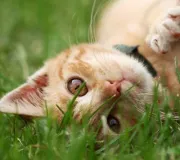Cats are excellent self-groomers. They spend hours cleaning themselves in order to look their best! With that being said, it’s not uncommon for our feline friends to experience dull coats every now and then.
Here’s what to do if you think your cat’s coat of fur is looking a little lackluster:
See Your Veterinarian
The first thing you should do when you suspect your cat of an unhealthy coat is set up an appointment at your veterinarian’s office. It’s possible that medical issues—skin infections, parasitic infestations, allergies, even serious diseases like diabetes—could be the root cause of your cat’s less-than-stellar appearance! Your veterinarian may recommend Veterinary Diagnostics, such as skin scrapings, blood tests, or allergy testing, to identify the underlying cause of your cat’s dull coat. You’ll want to have any serious medical concerns addressed before moving on to other solutions.
Improve Kitty’s Diet
A poor diet is one of the leading causes of dull coats in cats. Just like humans, cats require the right balance of proteins, vitamins, minerals, carbohydrates, and fats from the diet in order to have healthy skin and hair. A low-quality food with a lot of “filler” material is sure to cause a dull, coarse coat of fur. Often, switching your cat to a premium diet that is appropriate for her age and body condition is all that’s needed to return the coat to normal. Consult your vet for a recommendation, and be sure to ask about transitioning between foods.
Groom Regularly
Some of our feline friends aren’t as good at grooming themselves as others. This is especially true of obese cats, who may not be able to reach certain areas of their body, and older animals who can’t twist and turn as easily in order to lick and scratch themselves. In these instances, you’ll have to give your cat a helping hand in the grooming department. Run a brush made just for cats through the coat on a daily basis; this helps remove loose hair and spreads essential skin oils through the coat to keep fur moisturized naturally.
While grooming your cat, you may notice them coughing up hairballs. This is a common occurrence in cats, but it’s important to know when it becomes a concern. To learn more about this feline phenomenon, check out our article “All About Hairballs” and discover when you should seek veterinary attention for your cat’s hairballs.
Avoid Over-Bathing
Bathing your cat too frequently can dry out their skin, leading to a dry coat and an increase in shedding. Many veterinarians recommend bathing your feline friend only when she gets into something grimy or greasy. When you do give your pet a bath, make sure to use a feline-formulated shampoo and conditioning rinse.
Do you need help dealing with your cat’s dull coat? Call us, your local animal clinic in St. Lucie County, FL today — we’re here to serve all of your veterinary care needs.

